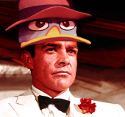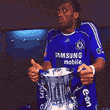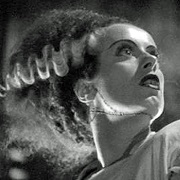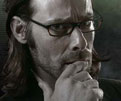|
attackmole posted:I'm reading poetry for the first time in my life. I'm doing a course on 18th century Brit lit right now, and so far the vast majority of the stuff we've covered has been pastoral poetry (Keats, Wordsworth, Byron, Coleridge, Clare etc., that general canon), which honestly, is boring as poo poo to me. I can appreciate the words, but I get tired of flowers and shepherds pretty fast. The one poem so far that really grabbed me was The Rime of the Ancient Mariner. Simple rhymes, and a cool story. I've also read Paradise Lost and enjoyed the hell out of that, so my nerdy self seems to be attracted to big, long, dramatic and fantastic poems. For someone relatively unfamiliar with classic poetry canon, what should I check out next? I don't know which Byron you've read, but you might want to check out "Don Juan" (pronounced "Jew-on"). That one seems to me to cover the bases for what you're looking for - well written (in a difficult meter), big, long and quite comic/enjoyable.
|
|
|
|

|
| # ? May 15, 2024 12:20 |
|
I'm currently an English major at a big ol' university that doesn't exactly cater to the liberal arts folk. I'm almost done with my Literature degree and still feel like there's so much I don't know, but I suppose a bachelors (in such a broad subject) isn't going to cover every base of "the canon." Could you perhaps provide a short (or long) list of works that you feel that every living, breathing English major should be intimately familiar with once they come out of college? I'd imagine stuff like Beowulf, Paradise Lost, and so on, but I'd really be interested to know what you think. Also, tell me what you think about this quote: “You can’t really study western literature intelligently or coherently without starting with the Bible. You’re simply ignorant of yourself if you don’t know the Bible.” - Gerald Bruns
|
|
|
|
Grouco posted:Do you have any favourite sexy/dirty poems about love/lust? I'd like to read something at an upcoming Valentine's day poetry event. I think the poet you want it John Wilmot, Earl of Rochester. I'd suggest "Ramble in St. James's Park" if you're more into paranoid misogyny, selections from "Signor Dildo" if you have the props, "Imperfect Enjoyment" if you're interested in impotent rage, "Regime de Vivre" if you don't actually care about the poem being by Wilmot, or Wilmot's song "Fair Chloris in a Piggsty Lay..." if you want to sing about barnyard masturbation and rape fantasies. If you want something slightly tamer, you could dig up Aprha Behn's "Disappointment," which along with Wilmot's "Imperfect Enjoyment" describe the generally understood range of range of English Libertine impotence poetry. If you want to come out of left field, since Wilmot and Behn's poems are often anthologized and consistent with their reputations, you could go with Herrick's 816 from the Hesperides ("Upon Loach"). That's more about love than sex, but still disgusting enough to be fun; Herrick is usually read as a sort of peaceful, pastoral poet who writes about rural love in the abstract, so "Upon Loach" is an inspired choice if your audience is ripe with Herrick scholars or frequent readers of Cavalier poetry.
|
|
|
|
attackmole posted:I'm reading poetry for the first time in my life. I'm doing a course on 18th century Brit lit right now, and so far the vast majority of the stuff we've covered has been pastoral poetry (Keats, Wordsworth, Byron, Coleridge, Clare etc., that general canon), which honestly, is boring as poo poo to me. I can appreciate the words, but I get tired of flowers and shepherds pretty fast. The one poem so far that really grabbed me was The Rime of the Ancient Mariner. Simple rhymes, and a cool story. I've also read Paradise Lost and enjoyed the hell out of that, so my nerdy self seems to be attracted to big, long, dramatic and fantastic poems. For someone relatively unfamiliar with classic poetry canon, what should I check out next? If you want fantastic and epic, I think you need to check out Blake. Everyone reads Songs of Innocence and Experience, but I think Marriage of Heaven and Hell or Visions of the Daughters of Albion might be more to your liking. More supernatural apparatus, more orcs and, generally speaking, more of the stuff you'd find in Dio cover art. Also, if "Porphyria's Lover" is to your taste, you and Browning are likely a good match. The poem's long enough for a plot twist, so read it carefully and slowly without scanning any summaries. You don't want to spoil it.
|
|
|
|
Naked Man Punch posted:I don't know which Byron you've read, but you might want to check out "Don Juan" (pronounced "Jew-on"). That one seems to me to cover the bases for what you're looking for - well written (in a difficult meter), big, long and quite comic/enjoyable. I can second this. You might also want to check out his "Manfred."
|
|
|
|
Destroy My Sweater posted:I'm currently an English major at a big ol' university that doesn't exactly cater to the liberal arts folk. I'm almost done with my Literature degree and still feel like there's so much I don't know, but I suppose a bachelors (in such a broad subject) isn't going to cover every base of "the canon." Could you perhaps provide a short (or long) list of works that you feel that every living, breathing English major should be intimately familiar with once they come out of college? I'd imagine stuff like Beowulf, Paradise Lost, and so on, but I'd really be interested to know what you think. This is a tricky, tricky bit. My first list, which I wrote and ditched, it just the stuff I'd want you to read, so it leaned really heavily toward early texts and 21st century white guys like Chuck Klosterman. But a few years ago I helped put together a reading list for a college's comprehensive exams. While it represents different periods better, it's also a product of committee thinking. That makes it a better snapshot of the canon in practice -- which better fits what you're asking for -- but it's definitely not a list with any surprises. Except omissions. There was a lot of haggling to make the reading manageable for an undergraduate major. And remember we're talking about works that an undergraduate should be intimately familiar with, not just works s/he should have read. This would probably serve just as well for someone who wanted familiarity with the canon as it stands though, again, there are omissions that just about anyone would find totally unforgivable. But enough qualifying. Here's what we came up with: Early English, Renaissance, and Restoration Chaucer: General Prologue to The Canterbury Tales The Clerk's Prologue and Tale The Wife of Bath's Prologue and Tale The Franklin's Prologue and Tale The Pardoner's Prologue and Tale The Nun's Priest's Prologue and Tale The Miller's Prologue and Tale Sidney: Astrophel and Stella: 1 ("Loving in truth, and fain in verse my love to show") 49 ("I on my horse, and Love on me, doth try") 71 ("Who will in fairest book of Nature know") Spenser: The Faerie Queene (Books I and III) Shakespeare: A Midsummer Night's Dream Twelfth Night The Tempest Richard II Henry IV, part 1 Antony and Cleopatra King Lear Othello Hamlet Macbeth Sonnet 18 ("Shall I compare thee to a summer's day") Sonnet 29 ("When in disgrace with fortune and men's eyes") Sonnet 73 ("That time of year thou mayst in me behold") Sonnet 146 ("Poor soul, the center of my sinful earth") Jonson: Volpone The Alchemist Donne: "The Ecstasy" "A Valediction: Forbidding Mourning" "Holy Sonnet 14" ("Batter my heart, three-personed God") Herbert: "The Collar" "Love (III)" Marvell: "To His Coy Mistress" "The Garden" Milton: Paradise Lost Dryden: "MacFlecknoe" Pope: "The Rape of the Lock" Swift: Gulliver's Travels Fielding: Joseph Andrews Burney: Evelina Boswell: Life of Johnson (abridged, e.g. the Penguin edition) Romanticism Blake: Songs of Innocence and Songs of Experience Mary Shelley: Frankenstein Wordsworth: "Tintern Abbey" "Ode: Intimations of Immortality" The Prelude (Books I and II) Coleridge: "Rime of the Ancient Mariner" "Kubla Khan" "Dejection: An Ode" Keats: "Ode on a Grecian Urn" "To Autumn" "Ode to a Nightingale" Austen: Pride and Prejudice Emma Nineteenth Century and Victorianism Browning: "My Last Duchess" "Andrea del Sarto" "Fra Lippo Lippi" Tennyson: "The Lady of Shalott" "Ulysses" "Tithonus" "Locksley Hall" Arnold: "Dover Beach" Bronte, E.: Wuthering Heights Bronte, C: Jane Eyre Emerson: “The American Scholar” Thoreau: Walden Douglass: Narrative of the Life of Frederick Douglass Hawthorne: The Scarlet Letter Dickens: Great Expectations Melville: Moby Dick Benito Cereno Whitman: Song of Myself “When Lilacs Last in the Dooryard Bloomed” Brent: Incidents in the Life of a Slave Girl Dickinson: "There's a certain Slant of light" "After great pain a formal feeling comes--" "She rose to His Requirement--dropt" "The Brain--is wider than the Sky" "My Life has stood--a Loaded Gun" "Tell all the Truth but tell it slant" "Like Trains of Cars on Tracks of Plush" Eliot: Middlemarch Adam Bede Twain: The Adventures of Huckleberry Finn Jewett: The Country of the Pointed Firs Modernism and Twentieth Century James: The Ambassabors The American DuBois: Souls of Black Folk Wharton: House of Mirth Joyce: Dubliners A Portrait of the Artist as a Young Man Woolf: To the Lighthouse Mrs. Dalloway Jacob's Room Conrad: Heart of Darkness Yeats: "Sailing to Byzantium" "The Second Coming" "Among School Children" "Easter, 1916" "The Tower" "Leda and the Swan" Eliot: "The Love Song of J. Alfred Prufrock" The Waste Land Four Quartets Hurston: Their Eyes Were Watching God Cather: The Professor's House My Antonia Shaw: Saint Joan Man and Superman (including Shaw's prefaces and the Revolutionist's Handbook) Williams: "The Dance" (1944) "Spring and All" "Pictures from Breughel" Stevens: "The Idea of Order at Key West" "The Anecdote of the Jar" "The Snowman" "Sunday Morning" "On Modern Poetry" "Man and Bottle" Toomer: Cane Faulkner: The Sound and the Fury Go Down Moses Wright: Black Boy Ellison: Invisible Man Miller: Death of a Salesman Hansberry: A Raisin in the Sun Achebe: Things Fall Apart Rich: Twenty-one Love Poems "Cartographies of Silence" Morrison: Beloved Rita Dove: Selected Poems Donald Hall: Old and New Poems Denise Levertov: Breathing the Water Galway Kinnell: Selected Poems Baldwin: Go Tell It on the Mountain Rushdie: Midnight’s Children Work in Translation Homer: The Iliad and The Odyssey Sappho: Poems Aeschylus: Oresteia Sophocles: Oedipus Rex Euripides: The Trojan Women Vergil: The Aeneid Dante: The Divine Comedy Murasaki: The Tale of Genji Boccaccio: The Decameron Rabelais: Gargantua and Pantagruel Cervantes: Don Quixote Racine: Phedre Moliere: Tartuffe De Lafayette: The Princess of Cleves Voltaire: Candide Goethe: Faust Stendahl: The Red and the Black Flaubert: Madame Bovary Tolstoy: War and Peace and Anna Karenina Dostoyevsky: The Brothers Karamazov and Crime and Punishment Ibsen: A Doll's House Chekhov: The Cherry Orchard Kafka: The Trial Proust: Swann's Way Mann: The Magic Mountain Literary Criticism Plato: Ion Republic (Books III and X) Aristotle: Poetics Sidney: An Apology for Poetry Dryden: An Essay of Dramatic Poesy Pope: An Essay on Criticism Johnson: "Preface to Shakespeare" Wordsworth: "Preface to the Second Edition of Lyrical Ballads" Coleridge: Biographia Literaria (Chapters XII, XIII, and XIV) Shelley: A Defense of Poetry Arnold: The Study of Poetry Taine: "Introduction to History of English Literature" Freud: "Creative Writers and Daydreaming" Hulme: "Romanticism and Classicism" Eliot: "Tradition and the Individual Talent" "The Function of Criticism at the Present Time" Auerbach: Mimesis Wimsatt and Beardsley: "The Intentional Fallacy" Brooks: "The Heresy of Paraphrase" from The Well Wrought Urn Frye: The Anatomy of Criticism Eagleton: Marxism and Literary Criticism Hirsch: Validity in Interpretation Todorov: Mikhail Bakhtin: Dialogical Principle Barthes: "The Structuralist Activity" Showalter: "Toward a Feminist Poetics” Kolodny: "Dancing through the Minefield" Derrida: "Structure, Sign, and Play in the Discourse of the Human Sciences" Kristeva: "The Bounded Text" Christian: Race for Theory Booth: The Rhetoric of Fiction The Company We Keep quote:Also, tell me what you think about this quote: I think Bruns is overstating what at best is a point of modest importance, and for a reason I'll get to in a second. There are good reasons for a student of Western literature to be familiar with most popular Bible stories, and yes there are reasons to be familiar with the practices of textual interpretation that have grown out of Biblical exegesis. And there are even reasons to be familiar with the language of e.g. the King James Bible, since its stylistic influence on e.g. Whitman is clear. But the idea that a student of Western literature should start his or her reading with the Bible is just absurd. Most of it, in any edition, is just terrible storytelling that hasn't been meaningfully adapted by anybody, and been sustained by cultural practices that aren't literary. I mean, you don't need to understand the story of Absalom to really get Faulkner. Yeah, it's something, but there are lots of somethings. And the idea that Bruns implies, that the Bible is somehow the center of Western lit, is straight bullshit. Look at any modern Western media, like film. There are more adaptations and rewritings and re-rewritings of Frankenstein than any part of the Bible. It's not even close. Granted, that only captures the last sixty years or so, but I think it's a fair statement about the Bible's literary influence. Sure, the Bible sells a lot of copies. But get on the subway or go to the library and I'll bet you'll see ten Dan Browns before you see a King James, for the same reason you'll see ten Dan Browns before you see someone reading a dictionary. The Bible's a reference book for most people. So while it might be an essential addition to any student's library, it goes on the bottom shelf with the thesaurus and the garage sale encyclopedias. Of course the Bible's cultural influence is impossible to overstate, but that's why English and Cultural Studies aren't the same thing. Bruns isn't the first person I've seen make this or a like claim, but I'm only prepared to grant it weight to the extent that the study of literature and the study of culture are synonymous. That is, if you were studying 16th century English popular culture, you'd drat well better know your Vulgate and Geneva. But 16th century literature isn't supposed to give you a cross-section of the culture; it's supposed to give you the works that have most shaped modern literary tradition (i.e. the ones that influenced writers who influenced other writers). So while 16th century England's religious pamphlets and Bibles were what everyone who was reading was reading at the time (and so would have to be a major part of any Pop Culture course on the period) they don't make sense as a major part of a literary curriculum.
|
|
|
|
Hey, much appreciated. I feel a bit better now.
|
|
|
|
Brainworm, I'm in an English 102 class and we're preparing to do little formal debates and our professor has sent my group an email saying that our plan to debate the existence of God is too controversial and would offend lots of people. I sent her an email back saying that academia's welcomed this particular debate since Plato and it was even permissible during the times when higher education was controlled by churches and caliphates. Was that too
|
|
|
|
Mullah Nasrudin posted:Brainworm, I'm in an English 102 class and we're preparing to do little formal debates and our professor has sent my group an email saying that our plan to debate the existence of God is too controversial and would offend lots of people. I sent her an email back saying that academia's welcomed this particular debate since Plato and it was even permissible during the times when higher education was controlled by churches and caliphates. Was that too Yo, she probably said that as a cover for "i don't trust some of you to not be giant jackasses to people of faith with this topic"
|
|
|
|
Mullah Nasrudin posted:Brainworm, I'm in an English 102 class and we're preparing to do little formal debates and our professor has sent my group an email saying that our plan to debate the existence of God is too controversial and would offend lots of people. I sent her an email back saying that academia's welcomed this particular debate since Plato and it was even permissible during the times when higher education was controlled by churches and caliphates. Was that too Yeah that was pretty over the top smug. Also, you're not Plato.
|
|
|
|
Platypus Farm posted:you're not Plato.
|
|
|
|
First things first. This thread is awesome and thanks for keeping it up. Second, how do you feel about Keats? I've loved him ever since I first started reading him in high school, and there's something in his poems that comes off the page and makes me look at life in a whole new way. What's your favorite of his works? Why? Also, did you see Bright Star? I thought it was okay.
|
|
|
|
Mullah Nasrudin posted:Brainworm, I'm in an English 102 class and we're preparing to do little formal debates and our professor has sent my group an email saying that our plan to debate the existence of God is too controversial and would offend lots of people. I sent her an email back saying that academia's welcomed this particular debate since Plato and it was even permissible during the times when higher education was controlled by churches and caliphates. Was that too Well, yeah. That is a little smug. And wrong. Remember what happened to Socrates, and what would have happened to Luther if Frederick of Saxony hadn't had a well-stocked basement and an intimidating private army. If you want this debate to go forward, I think you need to address your professor's concerns. These have nothing to do with historical practice, or with the historical standing of theological debate in higher education. They're about whether a debate on this subject will meet the educational goals of the class. She has every reason to expect that a debate about the existence of God will turn into a bunch of factional naysaying, which isn't any more properly educational than a Crossfire rerun. Were I in your position, the case I'd make goes something like this: We want to debate the nature of faith, with opposing sides maintaining that faith is rooted in (a) rational certainty and (b) necessary doubt. This effectively gives you the debate you want, since one side must maintain both that God exists and that this existence is provable, while the other must maintain that belief in God is not subject to rational scrutiny. There are rich traditions of thought on both sides, going back at least to Anselm's ontological proof of God's existence, moving through Pascal, and on to 20th century pop theology like e.g. Harold Kushner. And though modern theology has almost universally decided (b), significant bodies of religious culture operate according to (a). Framed that way, this debate might actually get interesting. But I'd still expect to get shot down, since any debate that touches this subject is likely going to involve lots of authority citing and disingenuously simple arguments -- as would a debate on e.g. abortion, the death penalty, gun control, or health care. So try a good topic instead. A good topic generally starts with an issue of particular and local concern -- perhaps whether your college should have an amnesty policy for reporting medical emergencies, so that some poor fratjack doesn't die of alcohol poisoning while his brothers break down the beer pong table before calling 911.
|
|
|
|
Thanks, bro. I think I'm going to take your advice and try to debate something that matters locally.
|
|
|
|
Brainworm, I saw a production of Midsummer Night's Dream performed by the Australian Shakespeare Company last night 'under the stars' ie in Melbourne's Botanical Gardens. It was a great production and absolutely one of the plays you'd want to see performed in open air but it raised a few questions and topics for debate and I'm interested in your perspective. Firstly let me disclose that I have not read the play since high-school (which was a loooong time ago) so please forgive me if these questions/comments are really simple. Or stupid. I thought Puck was supposed to be mischievous and almost a little malevolent. I thought of his errors as having a deliberateness to them, not with the intent to cause harm but to get enjoyment out of the mayhem. The actor portrayed him as child-like and slightly buffoon-ish, which put a different tone on the whole play. How should Puck’s behaviour be interpreted? The production had a lot of modern references in it, sometimes as dialogue, sometimes music (ie everything from Beyonce to Walt Disney tunes). I found some of it clever but some of it distracting. What are your thoughts on these kinds of devices used in productions of Shakespeare’s plays? The casting of the play was also....interesting. Puck and Lysander were very good looking actors with very nice bodies and the Director took full advantage, dressing them in tiny costumes and having them get their gear off at every opportunity. It led to some discussion afterwards about the ultimate casting decisions eg. Johnny Depp would do a great Puck, I think. If you were casting some of your favourite roles, in any of Shakespeare’s plays, who would you choose?
|
|
|
|
SHOPPA 4 LYFE posted:First things first. This thread is awesome and thanks for keeping it up. Thanks. I'm always a little surprised when it comes back to life. quote:Second, how do you feel about Keats? I've loved him ever since I first started reading him in high school, and there's something in his poems that comes off the page and makes me look at life in a whole new way. What's your favorite of his works? Why? I like Keats very, very much. He brings an intimacy to his poetry that the other Romantics -- especially Shelley and Byron -- never really mastered and probably did not care to exercise. I mean, Shelley and Byron are all grand conflicts; they've got this epic sensibility that I once found easy to admire but now find difficult to actually like. You know. Everything's a huge metaphysical conflict played out by gods and monsters. But Keats, especially in his Odes, works well with little things. Yes, you can use a traveler from an antique land and a desert colossus to remind a reader that history grinds everything to powder. But Keats brings the tragedy in this home (in e.g. Grecian Urn) without so much theatricality. I think good poetry is an art of small things, and that a good poet is more an astute observer than a grand thinker. That's more what I see in Keats; he looks at something everyday and makes it equal to the truth he's trying to tell, and he's able to do it without the whole matter sounding -- at least by poetic standards -- contrived. quote:Also, did you see Bright Star? I thought it was okay. I didn't, and I'm not sure I will unless I hear some good things about it first. Hollywood and its global counterparts generally do a really, really bad job with author biopics -- mostly, they end up being new settings for stock romantic or tragic situations, though they're occasionally just vehicles for actors to painfully extend their understood range. Seriously, the first thing I thought when I heard about Bright Star is that someone wanted to remake Love Story for everyone who really liked The Hours. But Ben Whishaw was apparently a fantastic Hamlet, so I'm sure he's up to whatever's put in front of him.
|
|
|
|
Emmjay posted:Brainworm, I saw a production of Midsummer Night's Dream performed by the Australian Shakespeare Company last night 'under the stars' ie in Melbourne's Botanical Gardens. [...] I certainly don't read puck as a buffoon. The single weightiest part of a character is, after all, what the character does. You can't ever trust what they say, since most well-written characters have some reason to lie. I mean, we don't say Hamlet's sane or insane based on what he tells Rosencrantz and Guildenstern. So what does Puck do? He doses the wrong Athenian Youth for starters, and regardless of whether this is a mistake, he's not in any rush to set things right -- he thinks the whole situation's hilarious. Likewise, he doesn't set things straight with Titania and Bottom, or the Athenian Youths, until Oberon straight up tells him to. And even then, he tries to get Oberon to sit back and enjoy "what fools these mortals be." Point is, I think Puck's actions paint him as malicious and unrepentant, and I think this carries through to his epilogue, too -- Midsummer basically pillories every kind of romantic relationship the audience would be familiar with, so his "if this bothers you, pretend it's just a dream" speech to them has a bit of an edge to it. This is a pretty straight-line reading of the character, sure. But it worked for Mickey Rooney. https://www.youtube.com/watch?v=XkmluxqWLPs quote:The production had a lot of modern references in it, sometimes as dialogue, sometimes music (ie everything from Beyonce to Walt Disney tunes). I found some of it clever but some of it distracting. What are your thoughts on these kinds of devices used in productions of Shakespeare’s plays? I think they're overused. There's a good case to be made for modernizing lots of aspects of Shakespeare's plays; you might put the Midsummer fairies in little green Tinkerbell dresses so that the audience can immediately recognize what kind of creatures they are, just as you might give Titania and Oberon, I dunno, pointy ears so that the audience can immediately realize they're sort-of-magical non-humans. That makes all kinds of sense, just as it might make sense to set some of the songs in Midsummer or As You Like It to recognizable melodies or infuse them with other modern musical conventions; when the music starts, you want an audience to know whether a character's going to start singing a love song or whether people are likely to start dancing. But I've seen lots of productions where this gets gratuitous or even distracting. Right now, for instance, I'm working on an Othello production where the setting is Empire Period; part of the logic behind that choice is that the audience needs to be able to easily discern between military officers of different ranks, and between soldiers and senators, but that we still need a setting where it makes sense for soldiers to carry swords and for ships to have sails. I think more complicated staging logics run huge risks; yes, you can put the senators in togas, the soldiers in camo, the military officers in modern dress uniforms, and Othello in a turban, and Desdemona can sing the "Willow" song to Eliot Smith's "Needle in the Hay." But that kind of production -- like what Taymor does in Titus -- can be straight-up disorienting for an audience who might, in all their simplicity, expect to know where and when the story told on stage is taking place. Point is, I think the infusion of modern media or iconography into a Shakespeare production makes tremendous sense as long as it's done with some concern for the audience; in most productions, it's probably absolutely necessary if basic elements of the story -- say, what someone's job is -- are going to be clear. But I've seen lots of productions that seem to be more concerned with what they can make the play do, or how they can do the play differently, than with meeting the audience where they're at. quote:The casting of the play was also....interesting. Puck and Lysander were very good looking actors with very nice bodies and the Director took full advantage, dressing them in tiny costumes and having them get their gear off at every opportunity. It led to some discussion afterwards about the ultimate casting decisions eg. Johnny Depp would do a great Puck, I think. If you were casting some of your favourite roles, in any of Shakespeare’s plays, who would you choose? I think I already mentioned that Michael Cera or similar might make a great Hamlet, since he'd draw attention to how Hamlet is different from, say, Old Hamlet or Fortinbras or Laertes, and establish a clear need for Hamlet to plot and scheme his way through the first four acts. I'd choose someone like Christian Bale for Laertes, just to make the that point as clear as possible. Also, Polonius can be windy, and he's rarely right about anything, but the play doesn't make much sense if the audience doesn't understand that Hamlet thinks Polonius is dangerous enough to need careful handling. So you need a Polonius who can project intelligence and competence to the other characters in the play even after the audience sees Hamlet get the better of him. I think Ian McKellan could do this really well (duh), and especially if he played Polonius as a sort of Reagan character -- you know, one whose out-in-front bumbling is actually an affectation that keeps other people off balance and never gives too much away. As long as we're casting Hamlet, I'd like to see Bob Hoskins as Claudius. This is partly based on the strength of his Iago, where he plays the repulsive schemer who can trick people into thinking he's fun and jolly; that's about where I peg Claudius, so I'd like to see what he'd do with the role. But for Midsummer I think I'd see Johnny Depp as a better Oberon than a Puck. Oberon's a little more reserved than Puck is, but just as clever and malicious, and maybe a bit more petty and twisted. For some reason, I can see Depp playing an Oberon who sees his wife with a donkey man and is like "don't lift that charm just yet. I want to see how far this goes," but who's still genuinely, if casually, interested in straightening out the Athenian Youths' love lives. Put another way, Oberon's a sociopathic meddler with a powerful but idiosyncratic moral life and dangerously childlike senses of curiosity and entitlement. I think Depp could play that role well for the same reasons he could play Willy Wonka, who's basically the same character in a different setting. And let me think. I've always thought Merchant would be a devilishly difficult play to cast, mostly because of Antonio. Antonio's love for Bassanio is deeply possessive -- he's willing to die at Shylock's hands as long as Bassanio's there to see it and so realize how weak Portia's love seems in comparison. How one does this when an audience isn't likely to see past the gay, I don't know. So Jake Gyllenhaal?
|
|
|
|
Brainworm posted:
I can't blame you for your hesitation, but it really is a fantastic film. Not only is it great in itself, its really tastefully done and is very respectful to its source material. I asked one of my Romanticism professors what he thought of it, and he thought it was by far the best Romantics-related film he'd ever seen.
|
|
|
|
Whose writing is more bleak and depressing, Harlan Ellison or Cormac McCarthy?
|
|
|
|
Jewellers posted:I can't blame you for your hesitation, but it really is a fantastic film. Not only is it great in itself, its really tastefully done and is very respectful to its source material. I asked one of my Romanticism professors what he thought of it, and he thought it was by far the best Romantics-related film he'd ever seen. Well, that seems a strong enough endorsement to pop it into my Nexflix queue. Thanks.
|
|
|
|
Doppelganger posted:Whose writing is more bleak and depressing, Harlan Ellison or Cormac McCarthy? Jesus. That's like asking which coffeehouse poet wears the most black. But I think McCarthy takes the prize. Ellison can be bleak, but he almost always leaves some kind of out -- a little window for redemption, even if that redemption goes unseen or unrealized. McCarthy, on the other hand, is just brutal. I haven't read much of him, and I've really only read Blood Meridian closely. But I don't see any part of that book that doesn't constantly turn up the volume on bleak. Hell, even the violence gets the blood sucked out of it.
|
|
|
|
Hey Brainworm, I really respect your opinion, (I've enjoyed and been quite pleased by your opinions in the rest of the thread), so I wanted to ask you if you think Joyce's Ulysses is worth all the hype. I wouldn't trust most academics with that question, because they're too interested in their street cred to give a straight answer, but you seem like an honest guy (how impertinent of me haha). From what I can see, judging by what I've read (of the book and of critical reviews) it's almost as though Joyce was just loving with everyone and Finnegan's Wake was when everyone realized that "The Emperor hasn't a stitch on." I almost get the feeling that it was included too quickly in the canon, and that in older times the fact no one really reads it (or wants to read) would have sent it into the musty attic of history, there to rot for all time. It's just that academics went for it too soon, and are now oh-so-carefully attempting to extricate themselves. I mean...any novel that needs to have an explanation chart secretly given to critics by the writer in order to approach sensibility can't really count as an artistic success can it? That's the kind of finished project that crazy old catladies writing erotica in their basements end up with- although, I of course know I could be entirely wrong. . But I do have to say, I was not impressed with part 1. Joyce packs it full of Catholic references (I am Catholic so I caught them pretty easily) but he doesn't use them well. In fact, the first one "introibo ad altare dei" is misused...after all, that's the prayers at the foot of the altar, but he's satirizing the offertory of the mass, so should use something from the "lavabo." I don't really want to study Joyce's life (edit: what I mean is, I don't feel like I should have to totally understand the man's every fart and poo experience in order to read a book), he seems to have been a rather nasty man, so what's the deal with this book? I'm willing to put in the time to really understand it- if someone could tell me WHY it might edify, enlighten, or improve me in some way. You know...art. Barto fucked around with this message at 09:42 on Feb 17, 2010 |
|
|
|
Brainworm posted:Thanks. I'm always a little surprised when it comes back to life. I also think Keats was the best at reconciling opposites out of all the other Romantics. Everything's one way for a lot of them, but for Keats (especially with negative capability) allows for things to go both ways, as they do in the real world. Totally agree with the astute observer statement. Don't get me wrong, I loved it, but I think (as a Keats enthusiast) I expected as much power from the movie as I did from Nightingale, which obviously I can't and probably won't get from anything else. It's still a powerful story, but it focuses more on his relationship with Fanny than Keats and his poetry. The scene where Fanny finds out that Keats has died was super moving. I'll admit it. I cried.
|
|
|
|
Brainworm posted:Jesus. That's like asking which coffeehouse poet wears the most black. I dunno, there's usually a glimmer of hope in SOME of things, especially The Road (which just sounds crazy but it's there).
|
|
|
|
Brainworm posted:I think the poet you want it John Wilmot, Earl of Rochester. I'd suggest "Ramble in St. James's Park" if you're more into paranoid misogyny, selections from "Signor Dildo" if you have the props, "Imperfect Enjoyment" if you're interested in impotent rage, "Regime de Vivre" if you don't actually care about the poem being by Wilmot, or Wilmot's song "Fair Chloris in a Piggsty Lay..." if you want to sing about barnyard masturbation and rape fantasies. I'm surprised Sheridan's "The Geranium" didn't make it in there. That's an awesome poem.
|
|
|
|
Brainworm, Long time lurker, first time poster. I go to a Big Research University, and the professors who are actually here to teach, not just indulge their own specializations, are too few and far between. It's nice to find profs who employ literature as a useful tool for learning thoughtful and humane communication as well as an enlightening experience in itself. I really like that you seem to fit into the better category. I wanted to ask what you think about the general state of the humanities, actually. I'm interested in doing a Communications or Cultural Studies MA (maybe PhD as well) to further my education in digital humanities. Anyway, something that you hear a fair amount about in the digital humanities is how the mainstream humanities have lost a sense of their own utility to society. Coming from a Big Research University I can certainly sympathize with this sentiment. EDIT: No love for the beat poets in your canon? Maybe only in a strict American canon, eh? Yeah, probably... Ryan-RB fucked around with this message at 23:02 on Feb 19, 2010 |
|
|
|
Brainworm posted:Jesus. That's like asking which coffeehouse poet wears the most black. McCarthy is brutal; the man doesn't string up any lights in his dark tunnels. But - I don't think he leaves us without a way out. Even in Blood Meridian (his bleakest). BM has a surreal and horrific ending but: you get the sense that the Judge is at least a somewhat abstract, if not completely other-worldly being. For my own part I read him as an abstract philosophy of history made flesh, with supernatural signs thrown in here and there to keep us guessing. Not to mention loving freaked out. Didn't Harold Bloom write somewhere that the Judge actually gave him nightmares? Yeah... Anyway, my point: the Judge's concern is exercising his own agency. To him this is a difficult and important feat, since history has a destiny for us that must be violently reclaimed by each individual. Whether you read the Judge as an abstract idea with a voice or a supernatural being put on Earth to raise ruckus, he seems to express himself only through others: telling stories, advising, helping the Glanton gang in their own ill-fated tasks. As a being who exercises his agency only through his influence over others, he requires listeners to vindicate him and to carry his existence to task through action. Which is why the Kid, grown old at the end, represents a small measure of hope. He doesn't listen: "You ain't nothin," he actually says verbatim to the Judge. He just goes on living a silent and plain life which, to me, makes him the Judge's perfect opposite, since the Judge is only his words. They're big, bad words. And big hairless men might...well, let's not spoil it. But nihilistic as the book is, I think what it says is that: here's one way of looking at the world. It's convincing isn't it? But maybe we can live as though it isn't true.
|
|
|
|
Barto posted:[...] I wanted to ask you if you think Joyce's Ulysses is worth all the hype.[...] One answer, short: I don't much like it. A second answer, longer: It depends on what you mean by "worth it." There are people who like Joyce and Ulysses especially, but the book has always seemed cold to me. It's like what Johnson said about Julius Caesar. So Ulysses is a staggering intellectual achievement that -- at least to me -- never comes across as anything other than a demonstration of Joyce's literacy. I have never, for instance, heard someone say that they found Leopold and Molly's relationship (or any part of the book) poignant or moving, though many parts are funny. That's another way of saying that I have heard lots of intellectually complicated responses to Ulysses, but never an emotionally complicated one. Of course this is probably not the point of the book, just as it does not seem the point of many works of high modernism. So that's where I stand on Ulysses. If you like your art intellectually complicated, it's a great place for you. Me, I think art is at its best when it evokes intense and complicated emotional responses, too.
|
|
|
|
SHOPPA 4 LYFE posted:I dunno, there's usually a glimmer of hope in SOME of things, especially The Road (which just sounds crazy but it's there). Yeah, it's in The Road -- any time you've got a father/son style relationship, you've got a glimmer of hope, right? Um. At least until hordes of savages with a penchant for murder and sodomy sweep over the army.
|
|
|
|
Brainworm posted:Yeah, it's in The Road -- any time you've got a father/son style relationship, you've got a glimmer of hope, right? Um. At least until hordes of savages with a penchant for murder and sodomy sweep over the army. Yeah. I think it functions more on the level that McCarthy is going, "LOOK. LOOK AT THIS AWESOME, BEAUTIFUL RELATIONSHIP YOU (CAN) HAVE WITH YOUR CHILD," rather than trying to make us think about the goings-on of the book, "Oh this is nice." Brainworm posted:If you like your art intellectually complicated, it's a great place for you. Me, I think art is at its best when it evokes intense and complicated emotional responses, too. Yes. A thousand times yes.
|
|
|
|
Brainworm posted:One answer, short: I don't much like it.
|
|
|
|
Brainworm posted:So Ulysses is a staggering intellectual achievement that -- at least to me -- never comes across as anything other than a demonstration of Joyce's literacy. I have never, for instance, heard someone say that they found Leopold and Molly's relationship (or any part of the book) poignant or moving, though many parts are funny. When I took a class on James Joyce, the professor took extreme pains to remind us of the emotions of the characters, particularly the complicated mess that is Leopold's and Molly's relationship. Often, he was the tempering voice of reason behind most of the funny scenes in the book -- "This may seem really funny, but if you think about it, it's actually really sad" and such. I think it's really easy especially in the middle of the book (which I think drags) to forget that Leopold basically left home so his wife could commit adultery, but if you keep it in mind, a lot of Bloom's meandering at least becomes interesting. I mean, he's really digging for excuses not to come home when he goes to visit Mrs. Purefoy in the maternity hospital. And then there's the whole Stephen / Bloom father-son thing going on -- except only on Bloom's end, and it's rather twisted. (One way Bloom tries to bond with Stephen is by showing him a revealing picture of Molly.) Then again, my professor was about Bloom's age, married, and with a daughter soon to graduate from high school, so maybe he just identified with Bloom quite a bit more than you did and wanted to rehabilitate him with a class likely put off by the difficulty of the text. Personally, I loved most of Ulysses. The hospital chapter can go gently caress itself, though.
|
|
|
|
Is the job market for english phds as bad as everyone says, or worse?
|
|
|
|
As I'm one of those academics who "does" Joyce I guess my opinion is unreliable, but I don't think Ulysses would have the ongoing resonance it has without emotional appeal. It's chock full of moments by turns heartwrenching and hilarious: on the former count, Stephen's meeting with his sister at the bookstall and Bloom's vision of his dead son; the latter, Bloom's love letter as "Henry Flower" and his imagined ascent into heaven. Finnegans Wake is even funnier but I despair of ever convincing anyone of that because they have this vision of it as some unapproachable thing, rather than what it is: the perfect bedside book. A lot of this, by the way, is the fault of generations of academics trying to hog Joyce for themselves, pretending that his stories are just too far beyond the reach of those poor proles. Call it Stephen Dedalus syndrome. gowb posted:Is the job market for english phds as bad as everyone says, or worse? Who is "everyone"? It's bad but in light of an economy that will be in double-digit unemployment for years yet, it's not something anyone should be expecting pity for. Being an English professor is a highly desirable job; if anything this market represents a correction of several decades of lingering unrepeatable conditions (dating back to the GI Bill, really).
|
|
|
|
Here's a couple of things, since we've been pretty slow this last month. One, I'm applying for an adjunct humanities position at a local, large community college. I'll spend the next week getting my information together, and I've looked up a lot of the buzzwords. Make sure the resume is community specific (I've done many productions in the local/academic theatre), and I'm tailoring my application to the institution (mostly commuters). What else would you cats scream at a newbie to avoid pitfalls? The institution has acting classes, introductory theatre/technical theatre classes, and several others, so I'm going to market myself as the script analysis guy. I have a couple plays published, and I recently finished a screenwriter's certificate program at our state university and won a teleplay contest, so I've got credentials. This would tie in pretty well with the tenet of, "appeal to the community." They would get me to help herd student writers and increase our community appeal. So what do the masses want idiots like me to know? Second point, since I've just finished all these screenplay classes: what television series/movies do you all appreciate from a literary value? I've become a pretty big fan of "Dexter" and "Mad Men," and I've been following a bunch of movies. What have you ladies and gents seen that warranted attention from a writing perspective?
|
|
|
|
My adviser suggested I become an English major as a placeholder major until I decide on something next fall(since it's basically too late to declare any other major for next fall already). I kind of am at a point where I have to choose a major to stay in college, but, it really could be worse, I did very well in my college English classes, and a lot of classes might be applicable to other majors (I'm leaning towards a media arts major). Is there any sort of downside to this that I'm not seeing? I don't really have much problem writing long research papers or anything like that.
|
|
|
|
bartlebee posted:Here's a couple of things, since we've been pretty slow this last month. English major, not prof, but my English and Cultural Studies profs deeply adore classic HBO in the vein of Sopranos, Six Feet Under and The Wire.
|
|
|
|
Ryan-RB posted:English major, not prof, but my English and Cultural Studies profs deeply adore classic HBO in the vein of Sopranos, Six Feet Under and The Wire. That was actually the discussion I would like to spark for a few posts, if anyone cares to participate. The industry majors are arguing at this point that, for long form storytelling, television is where it's at (I love ending with prepositions). The Wire has been a prominent example and HBO, as far as networks go, has been a recurring example. I started in playwriting and fiction, so I love to hear from fiction people, because they tend to the choosiest.
|
|
|
|
I've really gotten into Mad Men as of late, and I think that it's brilliant. It has some of the best character development that I've seen in television, along with the thing thats actually draw people in (an incredible commentary on 20th century American life, from gender roles to post-war capitalism). The thing is, it's such a visual use of media that I don't think it can be classified in the same manner as other "literature." The writing is very good, but again -- much of its appeal comes from the visual representation of the America of the early 1960's. It's wonderful storytelling, and it couldn't be done anywhere but television.
|
|
|
|

|
| # ? May 15, 2024 12:20 |
|
And that was another particular problem with bringing it up - as you said, this is a form that can't be utilized in other media. But I'd love to hear some opinions, even though I completely agree with this.
|
|
|




















